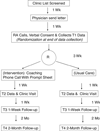An intervention to improve communication between breast cancer survivors and their physicians
- PMID: 21058159
- PMCID: PMC3698870
- DOI: 10.1080/07347332.2010.516811
An intervention to improve communication between breast cancer survivors and their physicians
Abstract
Breast cancer survivors often use clues to convey their concerns to their oncologists. The authors conducted a randomized trial of a communication coaching intervention in which 22 female breast cancer survivors were randomized to the coaching and 22 to treatment as usual. They hypothesized that the intervention would increase breast cancer self-efficacy, improve mood, and reduce fears of recurrence. Through a series of ANCOVAs they found that the intervention led to increases in self-efficacy. Changes in self-efficacy predicted changes in anxiety, depression, and womanhood fears. This coaching intervention shows promise but requires additional studies to establish is efficacy and effectiveness.
Figures
References
-
- Arora NK. Interacting with cancer patients: The significance of physicians communication behavior. Social Science & Medicine. 2003;57:791–806. - PubMed
-
- Avis NE, Crawford S, Manuel J. Psychosocial problems among younger women with breast cancer. Psycho-Oncology. 2004;13:295–308. - PubMed
-
- Bandura A. Self-efficacy: The exercise of control. New York, NY: W. H. Freeman; 1997.
-
- Beckham JC, Burker EJ, Lytle BL, Feldman ME, Costakis MJ. Self-efficacy and adjustment in cancer patients: A preliminary report. Behavioral Medicine (Washington, DC) 1997;23:138–142. - PubMed
-
- Bloom JR, Stewart SL, Chang S, Banks PJ. Then and now: Quality of life of young breast cancer survivors. Psycho-Oncology. 2004;13:147–160. - PubMed
Publication types
MeSH terms
Grants and funding
LinkOut - more resources
Full Text Sources
Medical



